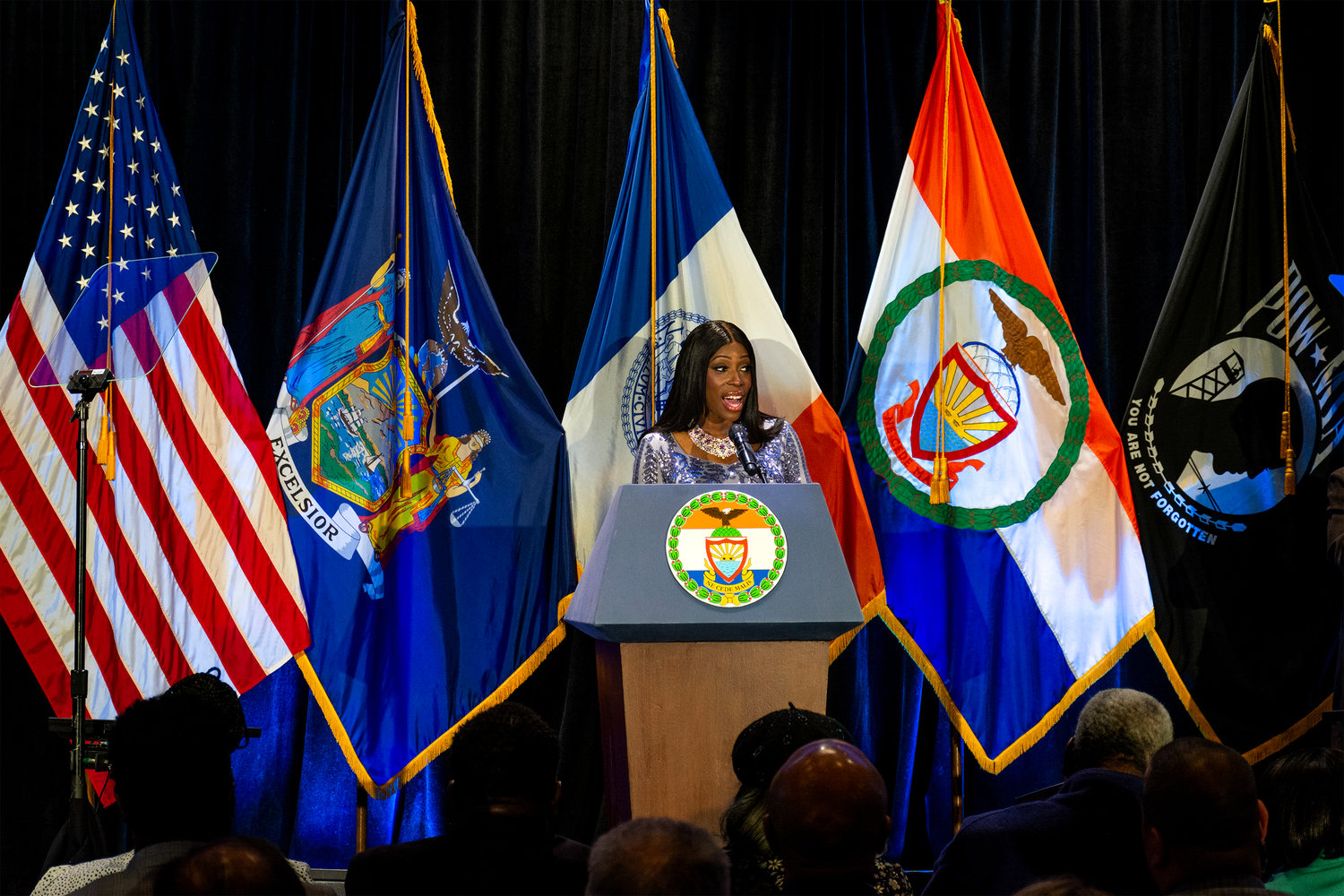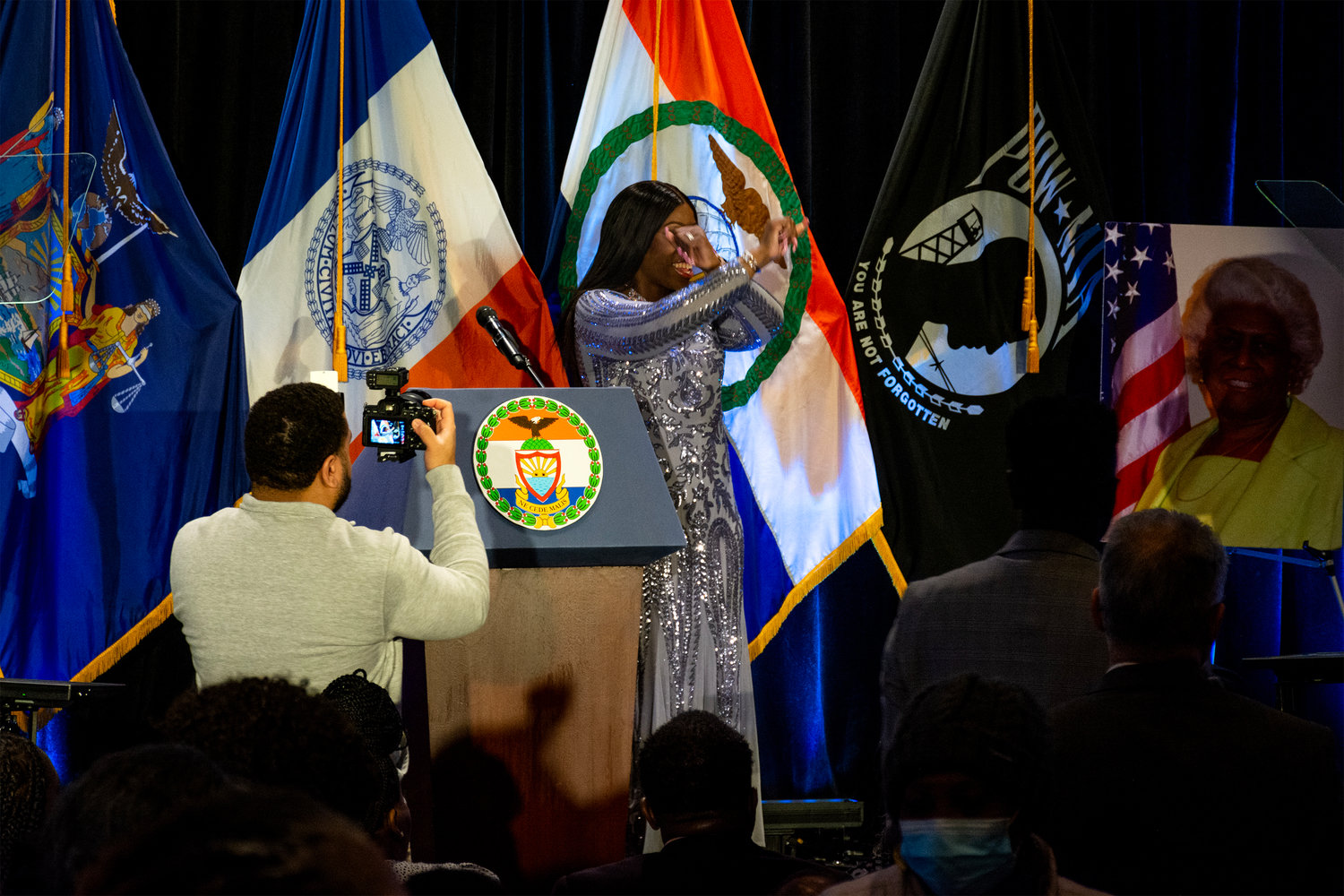Gibson plots the Bronx’s future as ‘global destination’
Borough president lays out her vision for 2023 in Manhattan College speech
The issues of small businesses, public safety and affordable housing will take center stage in the Bronx in 2023, Bronx Borough President Vanessa Gibson said in her first State of the Borough address March 1.
But what may have gotten the most attention was Gibson’s touting of the borough’s role in launching one of the most innovative eras in music.
“You all know that the Bronx, not any other the borough, is the birthplace of hip hop,” Gibson said, winking at the most prominent Brooklynite in the room — Mayor Eric Adams, who arrived a few minutes into her speech. She was teasing a special event at the new Hip Hop museum in the Bronx later this year.
Her supporters and political allies filled the front rows in the banquet hall at Manhattan College’s Kelly Commons.
Gibson weighed in on the current wave of economic development projects headed for the Bronx, including the redevelopment of the Kingsbridge Armory, the new hip hop museum located in Bronx Point on the Harlem River waterfront, the fledgling legal cannabis industry, and Metro-North’s Penn Station Access project – “a game-changer” for east Bronx, Gibson said.
New York attorney general Letitia James, state comptroller Thomas DiNapoli, city comptroller Brad Lander, and Manhattan borough president Mark Levine delivered opening remarks.
Borough presidents play a formal role in land use matters that come before the city planning commission and the city’s annual budget. They appoint members to community boards, education councils, and other public bodies, and they can introduce legislation in city council, but don’t vote.
Otherwise, the office provides a fair amount of creative license to convene agency heads and set an agenda for the borough.
The Bronx borough president is accepting community board applications electronically in both English and Spanish for the first time ever this year. Gibson has also extended the application deadline to next Wednesday, March 15.
She said the changes are part of her effort to eliminate barriers for residents to have their voices heard.
Gibson played up the Bronx’s first-ever children’s museum, which opened across from the Bronx Terminal Market last December, and the new Universal Hip Hop Museum coming soon two blocks away.
It will be housed within L+M Development’s $349 million mixed-use megaproject at Bronx Point.
Stay tuned, Gibson said, for an announcement about an event at the new museum this August, which marks the 50th anniversary of the 1973 party in the recreation room of 1520 Sedgwick Ave. where Clive Campbell (AKA DJ Kool Herc) and his friends introduced the neighborhood to a musical style called rapping.
“Think about the impact that this museum will have on the Bronx and beyond, bringing tourists from all around the world,” Gibson said. “It will bring local jobs, preservation of hip hop history, and affordable housing along the waterfront.”
She emphasized the pandemic’s ongoing toll on merchants and storefront businesses in the Bronx — “the fabric and the foundation of our borough” – and unveiled the first in a series of new small business loans the Bronx Overall Economic Development Corp. will begin offering this year.
“Anytime I have asked a small business owner what are the top issues that you face on a daily basis, some will say it’s difficult to navigate government. Others will say it’s difficult to find good staff. However, almost all will say getting access to capital is their biggest challenge,” Gibson said.
“For far too long Bronx businesses have been an afterthought when it comes to these issues.”
An audit released in December by city comptroller Brad Lander found that only nine businesses in the Bronx received a Covid-19 loan from the city’s small business services agency out of 519 that applied. Only 2.2 percent of loans went to the Bronx, while more than half were awarded to Manhattan.
As a city councilwoman, Gibson championed the 2017 Right to Counsel law providing low-income tenants access to a lawyer while facing eviction in housing court.
As borough president, Gibson said she’s working with elected officials and advocates like CASA Bronx to see that the law is fully implemented. Despite its staggering success in reducing evictions across the city, the legislation has lately failed to deliver on its promise of universal legal access.
Since the eviction moratorium was lifted last spring, Gibson said, “the need for representation has only increased.”
She also stressed her commitment to creating more housing in the Bronx, and that she’s prepared to have “difficult conversations” to see to it.
“Every neighborhood – let me repeat — every neighborhood must do their fair share in welcoming, affordable housing opportunities,” she said, with emphasis.
“Our administration is deeply committed to fighting for housing that is truly affordable and that can accommodate growing families with multi-bedroom units, community centers, supermarkets, health care facilities, and other necessities because we want our residents to stay in their communities and not face displacement.”
Gibson also focused on public safety, which she said is the core of her office’s work and “deeply personal” to her.
She chaired city council’s public safety committee for three years beginning in 2014 and fought to increase funding for district attorneys and expand community policing through the addition of more than 1,000 police officers to the NYPD.
This year, Gibson announced she is creating a new public safety division within the borough president’s office which will bring together the NYPD, first responders, antiviolence advocates, and clergy to “holistically” address crime in the Bronx.
“Public safety is a priority for us in our communities, as well as on our rolls,” Gibson said.
The rollout of the new legal cannabis industry is also top of her mind. She praised Bronx Community Foundation co-founders Derek and Desmond Lewis and president Meisha Porter for their work to launch the Bronx Cannabis Hub, which has partnered with Gibson’s office on a number of initiatives to educate dispensary applicants. They also provide them with the tools they’ll need to succeed in the business.
She’s committed to an industry that is truly local, Gibson said.
“Cannabis has the potential to be an economic engine for our borough by inspiring a new class of entrepreneurs and empowering those once disenfranchised by the justice system.”
She also addressed fire safety and praised city and state legislation tightening space heater regulations after the Jan. 9, 2022 fire that engulfed the Twin Parks apartment complex and took 17 lives.
She reiterated her commitment to vision zero to end traffic violence, noting 2022 was the deadliest year in pedestrian fatalities for children in the Bronx in the vision zero era.
She will continue to support the Digital Equity Initiative’s efforts to increase internet access in the borough after the success of the first LinkNYC kiosks, which brought free public wi-fi to more than 800,000 people in the Bronx in December alone.
And Gibson plugged the Bronx Tourism Council’s signature event, Bronx Week, “a tribute to the people, the places, and the businesses that make our borough so great.”
Bronx Week will begin May 8. “Stay tuned,” Gibson said.









